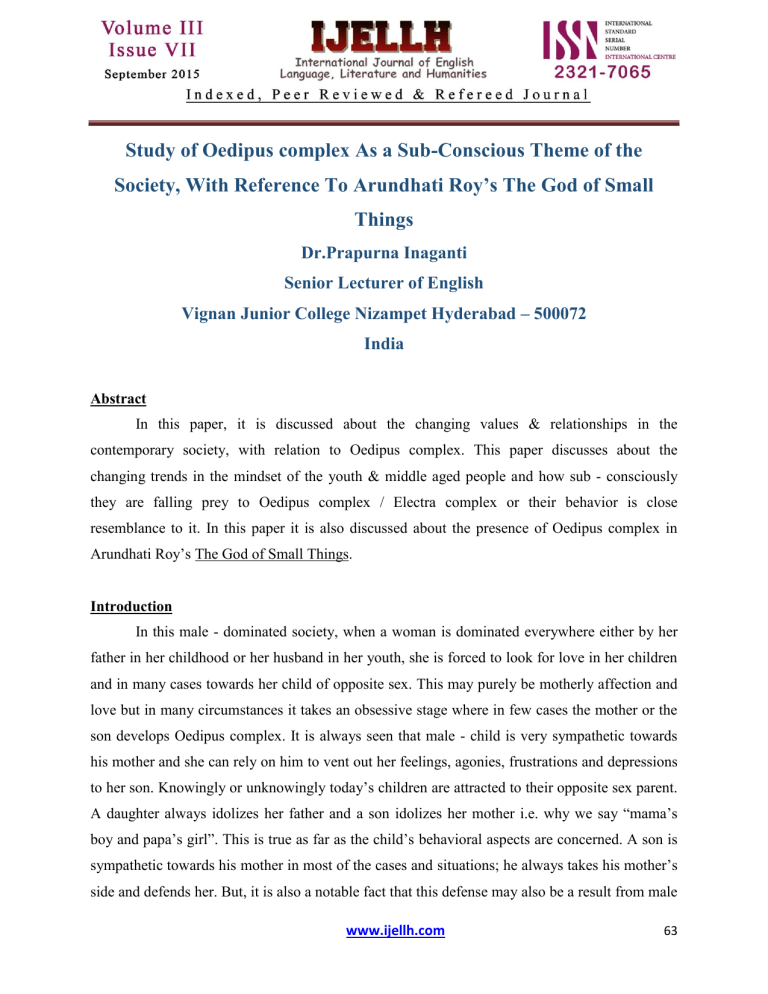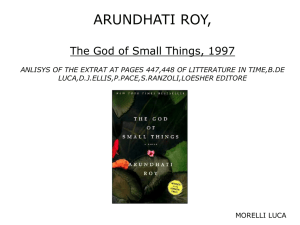Study of Oedipus complex As a Sub

Study of Oedipus complex As a Sub-Conscious Theme of the
Society, With Reference To Arundhati Roy’s The God of Small
Things
Dr.Prapurna Inaganti
Senior Lecturer of English
Vignan Junior College Nizampet Hyderabad – 500072
India
Abstract
In this paper, it is discussed about the changing values & relationships in the contemporary society, with relation to Oedipus complex. This paper discusses about the changing trends in the mindset of the youth & middle aged people and how sub - consciously they are falling prey to Oedipus complex / Electra complex or their behavior is close resemblance to it. In this paper it is also discussed about the presence of Oedipus complex in
Arundhati Roy‟s The God of Small Things.
Introduction
In this male - dominated society, when a woman is dominated everywhere either by her father in her childhood or her husband in her youth, she is forced to look for love in her children and in many cases towards her child of opposite sex. This may purely be motherly affection and love but in many circumstances it takes an obsessive stage where in few cases the mother or the son develops Oedipus complex. It is always seen that male - child is very sympathetic towards his mother and she can rely on him to vent out her feelings, agonies, frustrations and depressions to her son. Knowingly or unknowingly today‟s children are attracted to their opposite sex parent.
A daughter always idolizes her father and a son idolizes her mother i.e. why we say “mama‟s boy and papa‟s girl”. This is true as far as the child‟s behavioral aspects are concerned. A son is sympathetic towards his mother in most of the cases and situations; he always takes his mother‟s side and defends her. But, it is also a notable fact that this defense may also be a result from male www.ijellh.com
63
- ego or his ego - clash with his father. This is vice - versa as for as the young girl‟s behavior is concerned. A girl always idolizes her father and disapproves her mother.
A girl develops this soft - corner because of her childhood reminiscences of pampering and extra care taken by her father. She in her later life after getting married search for her father‟s traits in her husband. This is similar in the case of boys as well. He compares his wife with his mother whether it is her cooking or her behavior. So, we can say that this may not exactly be Oedipus complex or Electra complex but a psychological resemblance. This happens very commonly in our Indian society. To understand more about this we have to first understand what is Oedipus complex or Electra complex.
Oedipus Complex
The term „Oedipus‟ has been derived from the myth of king Oedipus of Thebes, who in ignorance married his own mother and had children by her. Oedipus was married to his own mother Jocasta and killed his biological father king Lauis. When Oedipus and Jocasta came to know the truth they were disgusted and guilt - stricken. Jocasta killed herself and Oedipus pierced his eyes and became blind. Since that time, he roamed around and is followed and served by his devoted daughter Antigone till he died on Mount Colonus.
Electra Complex
Jung was the first one who had offered Electra for the female version of Oedipus complex. Electra killed her own mother and her lover to be with her father. But the difference is it is a planned murder & Oedipus on the other hand kills his father unknowingly. The mythical character Electra has been planning to kill her mother Clytemnestra for many years. Although, her father Agamemnon was cruel she idealized him and accused her mother for neglecting him.
So, Freud and Jung named it female Oedipus complex or Electra complex.
In the world of literature, it is D.H.Lawrence who has brought Oedipus complex into light for the readers. It is a well - known fact that D.H.Lawrence himself was a victim of
Oedipus complex.
His mother Lydia Lawrence had a very strong hold on him, and he too treated his mother like a lover. It was she who was an emotional support and strength to David Herbert Lawrence.
His novels are completely autobiographical. His literature also was her inspiration. Graham www.ijellh.com
64
though states that The Dark Sun by D.H.Lawrence presents Oedipus complex in its completeness. If we look at the concept from the contemporary point of view it is true to some extent that mothers have a strong and emotional hold on their sons but this may or may not be
Oedipus complex. The element of sexual desire also cannot be negated in mother‟s behavior. If we notice the other side i.e. female Oedipus complex or Electra complex a girl is possessive towards her father. She since her infancy cannot see her mother to be very close to her father.
D.H.Lawrence also hated his father for his behavior towards his mother and Electra hated her mother and took side of her father. Freud, Ogden, Jung based their theories on their experiments with neurotics and the people who deal with psychopathology. According to them a child shows oedipal behavior since his/her infancy. Freud is an Austrian neurologist and the Co - founder of the psycho - analytic school of psychology. He is referred as the “father of psycho analysis”.
According to Freudian theory the Oedipus complex is a deep rooted desire in a male child to sleep with the mother and kill the father as he is the only obstacle for the child. Freud‟s theory showed the man in different light. There was a time when a man was considered to be the child of sin and has a possibility to attain salvation or grace of god. But, Freud presented man as a biological being who was born out of instinctual desires. According to him a child shows excessive affection for the parent opposite in sex to him or herself and a corresponding distaste or hatred.
With this definition Freud created confusion in the concept of Man on one hand and on the other hand presented man in the light of sex without any feeling or emotions. Freud‟s theory as related to the Oedipus complex is saying that humans are ruled by deep sexual and animalistic desire. This theory is also supported by D.H.lawrence in “Sons and lovers” and Freud in
Sophocles play „Oedipus‟ illustrated that a child or an individual comes across a stage where he/she feels intimacy towards his/her mother or father. This is due to the connection and bonding developed during birth. From this knowingly or unknowingly a child develops secret desire to kill the parent of the opposite sex. These feelings many times get repressed but subconsciously it is seen in the various aspects of their behavior or in their writings like that of D.H.Lawrence.
Oedipus complex and Brother/Sister complex is also presented by Arundhati Roy in her novel
“The God Of Small Things”. www.ijellh.com
65
Oedipus Complex in Arundhati Roy’s “The God of Small Things”
Arundhati Roy‟s novel The God of Small Things revolves around the characters of Rev.
Benaan John Ipe‟s family who is called as Pappachi in the novel. The primary characters are the twins Estha and Rahel, Ammu, Chacko, Mammachi, Velutha, Baby Kocchamma,Margaret
Kocchamma and Sophie Mol. The story revolves around the twins (Rahel and Estha) and their half - English cousin Sophie Mol and her tragic death. It is coincided with the illicit affair of a high class Syrian Christian lady and an untouchable paravan Velutha. Things and events change in a day after which the characters‟ lives are shattered Pappachi (an imperial entomologist) and
Mammachi (an accomplished Violinist) have two children, a daughter named Ammu and a son named Chacko. Chacko goes on to study as a Rhodes Scholar at Oxford where he marries a white woman named Margaret. They have a daughter named Sophie Mol. While Margaret is pregnant she falls for a guy named Joe, whom she marries after divorcing Chacko. Chacko is shattered and comes back to Ayemenem. Meanwhile, Ammu marries a Bengali Hindu tea - planter Baba and delivered twins (Estha and Rahel) in 1962. Baba turns out be alcoholic, liar and a whimsical person. He forces Ammu to sleep with his English Boss for which the latter disagrees. This leads to a divorce and she along with her kids moves back to Ayemenem. The major part of the novel takes place in 1969 when the twins were 7 years old. Joe was killed in a car accident, and Chacko invites Margaret Kochamma and Sophie Mol (his biological daughter) to Ayemenem for holidays.
Before Sophie Mol‟s arrival there is a big event on the way to Cochin is that the family goes to see The Sound of Music, the twin‟s favorite movie at Abhilasha talkies. Estha came out in the lobby to sing his favorite song from the movie where in he was molested by a lemon drink
Orange drink man. This leaves a lasting impact and unending fear in the mind of Estha. This further leads to psychological imbalance in Estha in maintaining successful relationships. Estha loses his ability to understand whom to love and how much to love as quoted by Arundhati Roy in her novel The God of Small Things. All the characters of the novel face severe identity crisis and are unsuccessful in maintaining healthy relationships. Ammu died at the age of 31 (Not old,
Not young, a viable die able age). Rahel‟s marriage with Larry Mccaslin also did not last long. www.ijellh.com
66
Velutha was killed due to his illicit love affair with higher class Syrian Christian lady Ammu.
Mammachi died and Chacko went to Canada. The only survivors of Reverend Ipe‟s family are
Baby Kochamma, Chacko, Estha and Rahel. Estha became a silent spectator of all the events going around him. Sophie Mol‟s death created turmoil in the lives of all the characters especially the twins Estha and Rahel.
Mammachi the most important character of the novel is biased and partial towards her son Chacko. She hates the idea of her son getting married to Margaret Kochamma. She was happy to see her son divorced and preferred to imagine that Chacko never loved Margaret at all.
The glimpses of Oedipus complex in her towards her son are evident from many instances of the novel. The novel moves back and forward i.e. 1969 and 1993. In 1969 when Mammachi started making pickles in her factory Paradise Pickles and Preserves, (when Pappachi retired from government services) Pappachi wouldn‟t help Mammachi in her pickle business. He considered it to be beneath his status. He was very Jealous of Mammachi‟s success and the attention she is getting. She used to beat her every night with a brass flower vase to show her place. He also showed her in bad light by going out shabbily and unkept. He made Mammachi responsible for his condition. He also made it a point to show people that she neglected him, which made everyone think about the incapability of working wives in keeping the family intact. Once
Pappachi was beating Mammachi with a brass flower vase and Chacko discovered him doing so and saved Mammachi from him. This incident made Mammachi to develop oedipal relationship with her son Chacko. After this incident Pappachi never touched Mammachi and this further led
Mammachi to be distant from Pappachi and closer to Chacko. Mammachi also showed her possessive attitude towards Chacko by giving him the owner ship of the Paradise Pickles and
Preserves without considering her daughter Ammu. Mammachi also disapproves Margaret and thinks of her as a shopkeeper‟s daughter. This instance presents Mammachi not only oedipal but also as a casteist. Arundhati Roy also tells us that even if Margaret Kochamma was from Royal family, Mammachi still would have hated her for marrying Chacko. This behavior itself shows that she is Oedipus more and casteist less. The day Chacko stopped Pappachi from beating
Mammachi she diverted all her love and affection towards Chacko ignoring her responsibility towards her husband. When Chacko returned to Ayemenem, Mammachi made sure that his www.ijellh.com
67
sexual needs are fulfilled. She couldn‟t give sexual love to him but she had separate entrance built to Chacko‟s room so that he could have secret hookups with female workers without the rest of the family members knowing. She even justified his sexual acts by saying that men also have biological needs. When Margaret Kochamma comes to visit Ayemenem house, Mammachi hopes that Chacko shouldn‟t sleep with Margaret. Mammachi even checks for stains of semen on the bed sheet after Chacko leaves the room. This shows the inquisitiveness of Mammachi towards the sex life of Chacko. Mammachi even disapproved Ammu when Ammu said that even after their divorce Chacko had loved Margaret. She shows her disgust whenever she hears about
Margaret. When Sophie Mol and Margaret come to greet her she gives a very cold reply to
Margaret. So, we can say that Mammachi had oedipal feelings towards Chacko. She was psychologically dependent and possessive about him. Arundhati Roy had not only presented
Oedipus complex but also Brother Complex in glimpses.
Brother Complex:
It is defined as an obsessive love and affection towards the sibling of the opposite sex. In this novel The God of Small Things, Estha and Rahel are (dizygotic egg) twins. Rahel develops brother complex in her later stage of life i.e. when she was 31, she separated from her husband
Larry Maccaslin. He loved her but she seemed to be distant and indifferent when he made love with her (i.e. she was thinking of someone else). Estha was also 31 but he became silent and is indifferent to the world. In the entire novel the twins are referred as „them‟, „us‟ and „we‟. They are presented as a single entity and identity. Rahel comes back to Ayemenem in 1993 when she was the same age of her mother when she died. She notices Estha who have become very silent and Rahel tries to develop the same warmth in their relation. They even tried to share their thoughts and dreams. Estha returns to Ayemenem completely dejected and shattered. Rahel also visited on the sole purpose to meet Estha. Since her childhood the twins are closely connected to each other. They develop the sibling complex in the later stage. Rahel in the chapter of The God of Small Things “Wisdom exercises note books” and look at little trinkets that they collected as kids. Both the twins spent a lot of time together. Estha is bare bodied washing his clothes and
Rahel searches for her traits in him. Rahel develops the urge of love towards Estha. They held each other for a long time and ended up having sex. Here, in this situation Biology and sex www.ijellh.com
68
played a vital role blinding both Estha and Rahel. They lost their sensibility of relationships, sex and deprivation overpowered them. Roy presents the example of Ammu and Velutha that children also violated the love laws like them they “lay down should be loved. And how. And how much”. So, we can say that Arundhati Roy presented her characters from psycho- analytical point of you focusing on Oedipus complex, Electra complex and Brother Complex.
Conclusion
We can conclude that Oedipus complex is subconsciously present in the contemporary society. This presence is highlighted and displayed in various aspects of behavior of a mother, father or son and daughter. Knowingly or unknowingly mothers and fathers show obsessive affection and love towards their child of opposite sex. This has been presented and highlighted by various authors like D.H.Lawrence, Freud, Jung and Arundhati Roy. So, Oedipus complex /
Electra complex and also Brother/Sister Complex are prevalent in the society. These complexes may be sans sexual desire but it is consistent in the present society. On the whole if we see a person with any of these complexes he /she lose the ability and sensibility to differentiate between physical love and emotional love and become unfit in maintaining successful and healthy relationships. www.ijellh.com
69
Works Cited
1.
Freud, Sigmund, Three essays on sexuality ; 1965 print
2.
Hanson, Christopher, Sons and Lovers; 1986 print
3.
Harvey, Geoffrey: Sons and Lovers; 1987 print
4.
Paul, Rajinder: Sons and Lovers, A critical Study,; 1994 print
5.
Roy, Arundhati, The God of Small Things. New Delhi; India ink, 1997 print www.ijellh.com
70







